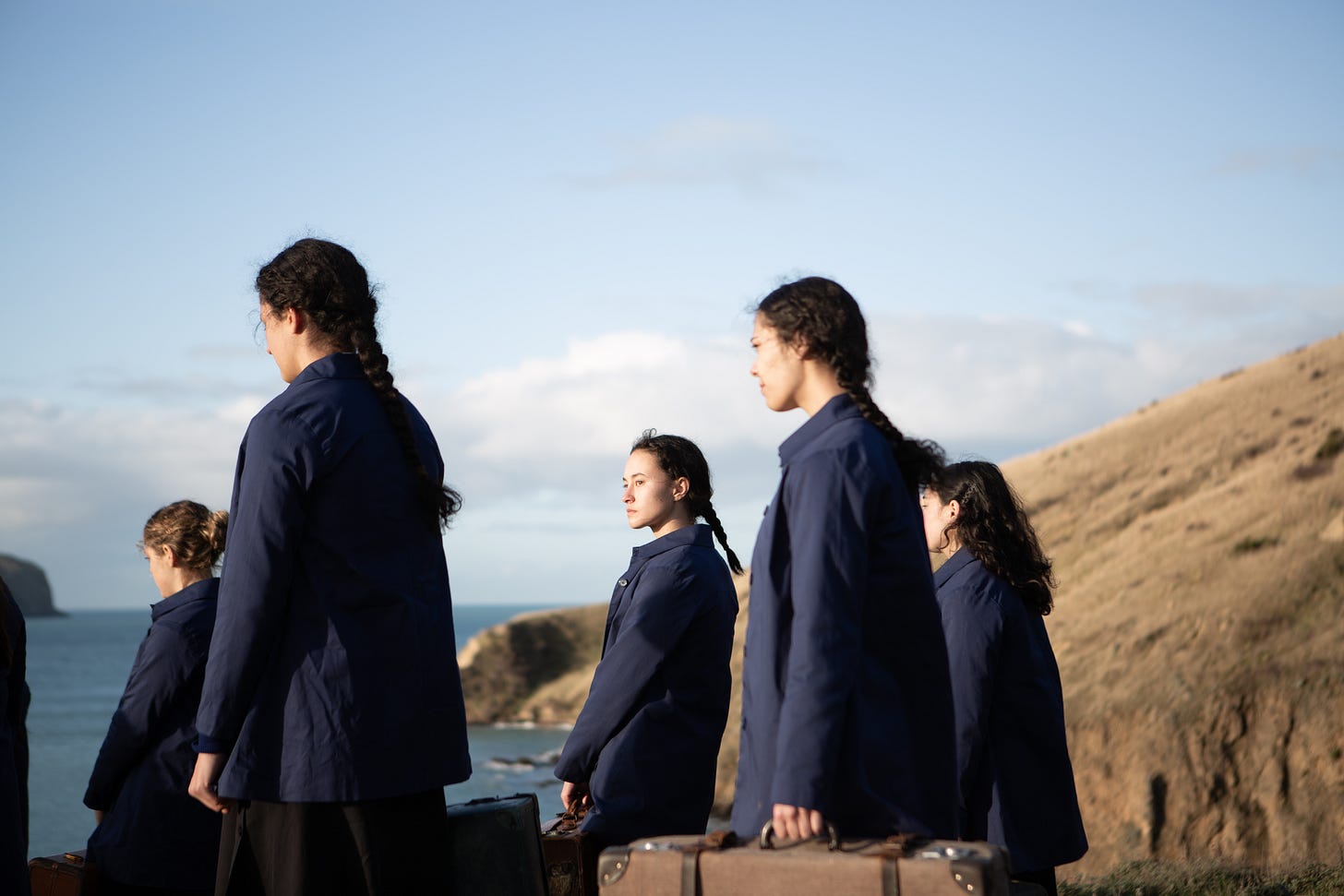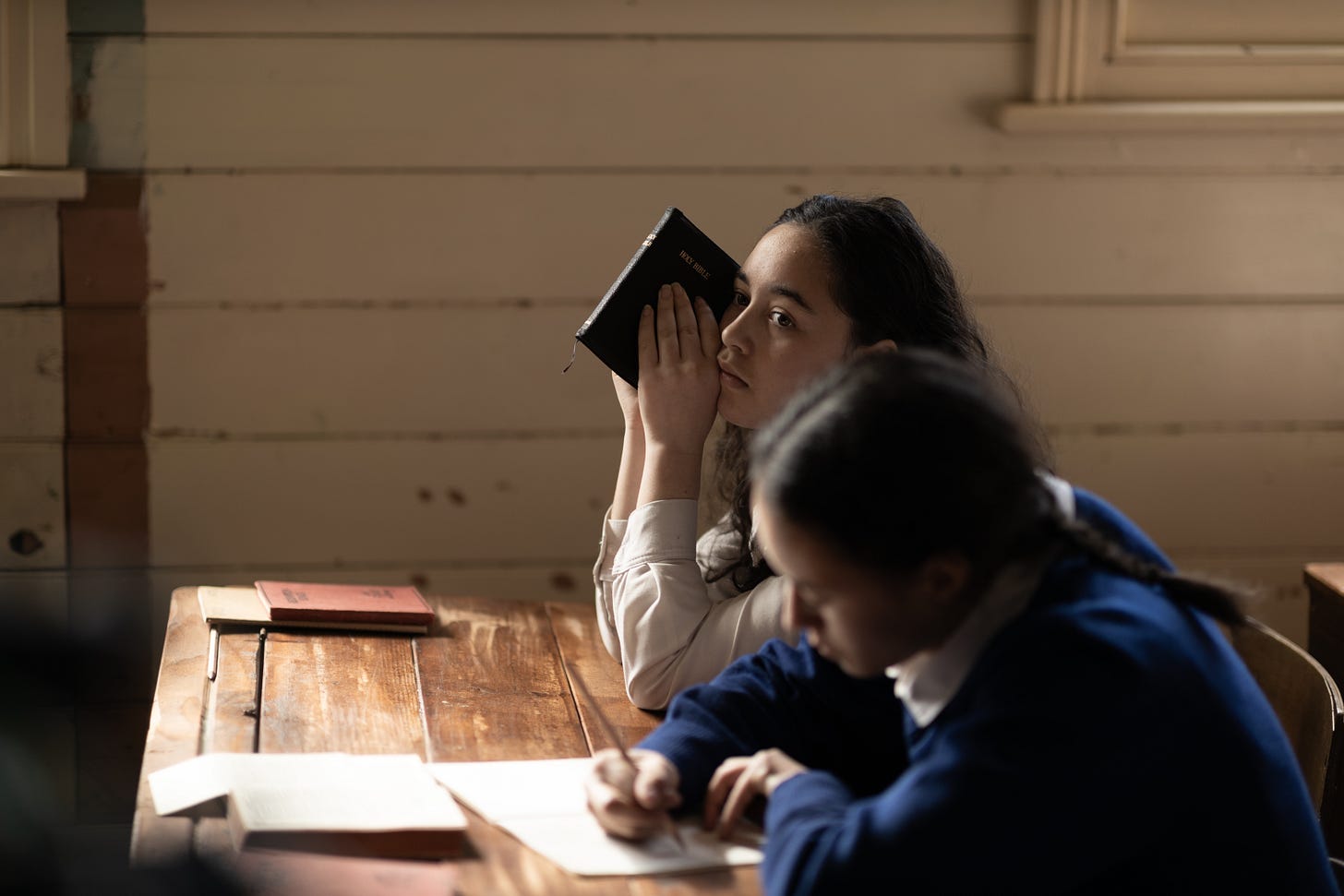We Were Dangerous Review: Girls on Top
A tale of assimilationist schooling goes from horror to hope
Seldom has a seeming feel-bad movie turned so feel-good as We Were Dangerous, and brilliantly so, by subverting the stereotypes that an anti-stereotype viewer may not even know they had. I hate to use the word “woke,” given how it's abused, but in its original sense of awareness of systemic racism, it describes the likely audience for this movie...and fucks with them in the right way. I try to be acutely aware of my own white privilege, and have to admire the shit of a movie that knows exactly what I'm therefore expecting, and twists it in a way I was not prepared for.
Pardon the vague spoilers, but it seems worthwhile to inform the viewer that We Were Dangerous is not going to be the same kind of miserable homework as The Magdalene Sisters or even The Handmaid's Tale, despite dealing with similar circumstances. It's also the best thing the increasingly irritatingly predictable Taika Waititi has been associated with in years, here as executive producer. I went into this movie knowing full well about assimilationist boarding schools, equally knowing full well the U.S. has barely come to terms with its own – thank you President Biden, screw you Hollywood – and thinking, well, I guess we're happy to point the finger at New Zealand on this, and maybe get a lesson we'll one day be willing to apply to our own. And though it put me through the wringer in the first half, let's just say the march of history does not have to be inevitable in a work of fiction.
It seems like a setting for a horror movie at first: a 1950s New Zealand boarding school for delinquent girls proves not to be entirely escape-proof for at least one of its student-inmates and thus the entire facility is relocated to an island that once hosted a leper colony, which still has a few buildings standing. The tyrannical Matron (Rima Te Wiata), who runs the place, is also sent there in partial punishment for allowing the escape – the patriarchy that is directly above her trickles down, and if she can just serve it more obediently by punishing and sufficiently brainwashing those under her, she might maintain her safe status in a society that actually hates her too for having Maori heritage. That element of pre-programmed self-loathing – Maoris are overwhelmingly bad Christians because they converted so late, she has been told and accepts – is key to how she brings the disciplinary thunder to the girls under her command.
We can debate what actually defines a horror movie – some say it must have supernatural elements, while others would argue that something like The Silence of the Lambs or Saw qualifies by virtue of having extreme gore. This has neither, and yet, it's arguably as terrifying a scenario for young women as it gets. Trapped on an island with no escape, under the supervision of a religious fundamentalist bootlicker, they now face a newer threat. The all-male administrators have decided that maybe the best thing for delinquent girls is that they can never, ever, reproduce their “defective” traits and should all be sterilized. The demarcated first-aid room, where we are told the girls will not be taught first aid lest they take too many physical risks as a result, is soon to become a field sterilization clinic for them all. And all of a sudden, The Island of Dr. Moreau's House of Pain feels less like fiction, and more like allegory. Did H.G. Wells know?
For Matron, this is a moral crisis at first, because she thought her purpose was to use enforced fundamentalist Christianity to prepare her girls for marriage. As soon as she realizes how disposable they all are, though, she quickly maneuvers to save her own skin and become a tool of the men in charge. It's depressing, but for a woman who's not white, there aren't many ways out. The movie offers lip service to her dilemma, but ultimately does view her as a collaborator deserving of scorn, even as she tries to plead her own case in voice-over narration.
The delinquent girls, of course, aren't what most serious people would consider delinquents today. Many are foster kids who ran away to escape abuse, and turned to petty crime just to get some food to survive on. Others are gay, or have gone too far with boys, and were sent by their parents, and you can probably guess by skin color which category is which.
Director Josephine Stewart Te-Whiu uses lush visuals and a decidedly non-horrific soundtrack to ironically contrast the island's beauty with its intended purpose – where it not for Matron and the policies she must enact, this could be a wilderness survival retreat summer camp, with girls bonding over shared problem-solving. It's not, of course, but some of them trauma bond anyway, notably the three who are forced to live in the leakiest house: rebellious Nellie (Erana James), young-and-goofy Daisy (Manaia Hall) and sheltered doctor's daughter Lou (Nathalie Morris). All three are impressive young actors to keep an eye on, though it would not surprise me if, as with Ghost World, the more conventional blonde Morris gets most of the job offers afterward, despite James having the clear edge in charisma.
DIGRESSION TIME! You're not supposed to do this in a review, but I'm in charge here! Okay, so I never went to a boarding school, let alone one for delinquents, but I did at one time have a headmistress reminiscent of this matron. Her real name was Jane Williams, but everyone called her “Fanny” behind her back – a wrinkled crone with an underbite that gave her a permanent scowl, known for yelling things like “STAND QUIETLY! You're an absolute disgrace!” She terrified all of us, and I presume she was a longterm product of the boarding school system and a board of education in Ireland that regarded students as a disciplinary problem rather than human beings to educate. We Were Dangerous momentarily made me wonder if Fanny ever dealt with a patriarchy that wouldn't let her be anything but who she was, yet in the end her legacy was one of terrifying children who couldn't fight back. So fuck people like that. Insight appreciated, nonetheless.
That's not a one to one comparison, obviously – there's no racial element involved in my own childhood. Still, if any country is experienced in the use of institutional Christianity to terrorize, it's Ireland. And speaking as someone who is in the process of slowly reading the Bible cover to cover, I have to wonder where they're getting such overall cruelty from. Jesus was a friend to the underdog, and even the violent Old Testament includes the book of Judges, which satirizes stupid and arrogant leadership. There's always a temptation by men in power to look only at the bans against premarital sex, without understanding that those were more about preserving tribal bloodlines than repressing desires. Most people would hardly know that the Bible condemns punitive interest rates far more frequently than it condemns homosexuality, for example.
I mention this in part because we have people in power who would gladly bring back harsh religious institutions and force mostly non-white “delinquents” into them. We Were Dangerous isn't just a snapshot of a repressive past – it's a warning of a future that people from said past want to bring about again. Mercifully, for both the viewer's entertainment and the fearful citizen's future, it offers hope and a pathway to change.
I feel like we've heard that before, too.
We Were Dangerous is now playing in select theaters. All images courtesy of The Forge.
Prefer not to subscribe via Substack? You can leave a tip through Buy Me a Coffee instead.








